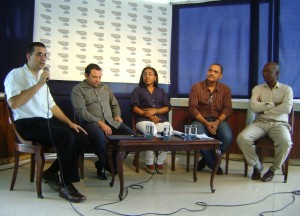From left to right: Antonio Rodiles, Roberto de Jesús Guerra, Yaremis Flores, Jorge Olivera, and Manuel Cuesta. Photo by the author.
HAVANA, Cuba, July 22, 2013, David Canela/www.cubanet.org — Last Saturday the independent Estado de SATS project sponsored a panel discussion among Cuban civil society activists. The participants included attorney Yaremis Flores, journalist Jorge Olivera (one of seventy-five dissidents imprisoned during the 2003 Black Spring crackdown), Roberto de Jesús Guerra, director of the news agency Hablemos Press, and Manuel Cuesta Morúa, a political analyst. The topic of the event was the current situation on the island following the latest political reforms and especially after recent trips overseas by many independent activists.
In regards to the experience of trying to be part of a globalized world, Flores emphasized that “the issue for Cubans is the lack of information.” Referring to his work representing those involved in legal cases, whose rights have often been at risk, he said, “If you cannot travel (to Geneva), they can send you information.”
Guerra and Olivera emphasized the need to strengthen the intellectual and organizational capabilities of the peaceful opposition. We must “continue organizing and empowering opposition groups,” said Guerra. For his part Olivera pointed out that the government “tries to manipulate international public opinion and buy time, which means we must adopt a more articulate and professional approach.”
According Cuesta Morúa, “the government has moved the battle of ideas abroad, and in Cuba tries to present a friendly dissent or a loyal opposition.”
The trend to a more balanced and dynamic migration flow would be a catalyst in the modernization of the country, as there is now a “transnational Cuban civil society,” as Rodiles called it.
As for the present, not all agreed with the idea that we are in a political transition, — as the journalist Julio Aleaga said — although this has not been officially declared. He explained that the reforms in China had begun in 1979, although its results were visible a decade later, with the Tienanmen protests, and that the Soviet Union no one imagined, in 1985, that Perestroika would be the dismantling of socialism.
Olivera believes that in the future “there will be a negotiation between the government and the opposition, because the country is in ruins.” In this regard, the journalist José Fornaris enunciated that “we have to prepare a program of government,” and not be ashamed to admit that we want to be part of the new government.
When the panel was asked what recommendations would that give to those traveling abroad, the lawyer Yaremis Flores suggested bringing evidence and documents on specific cases that demonstrate the problems of Cuban society that are not exposed in international forums, and so give a new face to the society, that humanizes it, and belies the manipulated figures from official groups of the government.
Cuesta Morúa added to avoid saying “I speak on behalf of …”, “I am the voice of …” He said there are receptive people abroad, who don’t want to hear protests, but rather proposals. And with regards to his experience at the last meeting of the Latin American Study Association (LASA), he noted that for the first time they broke the monopoly and the image (official) of Cuba at these academic meetings, due to the actions of independent sectors of the Island
This coming Saturday will be the three-year anniversary of the Estado de SATS project.
22 July 2013
From Cubanet

